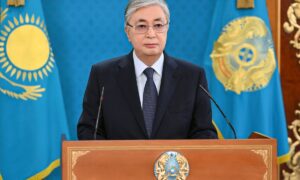Uzbekistan’s New Constitution is the legal basis of the Electoral System

Uzbekistan has created an electoral system that meets the highest democratic requirements
Elections are one of the main features of a democratic State through which the development and prospects of the country are revealed. This is the basic form of expression of the will of the people, the direct participation of citizens in the management of the affairs of the state. On the other hand, the promotion of active citizenship through participation in elections is evidence of the growth of our people’s political thinking, social activity and electoral culture.
As a result of a consistent, step-by-step modernization of the political, state and legal sphere, Uzbekistan has created an electoral system that meets the highest democratic requirements. In particular, over the past five years the electoral legislation has been consistently improved and the quality of the electoral process has risen to a new level.
At the same time, the electoral legislation was improved on the basis of internationally recognized principles, recommendations of high-profile international organizations and public opinion and was harmonized with the democratic reforms in the country.
Chapter XXII of our updated Constitution strengthened the basic provisions on the electoral system. In particular, according to our Basic Law, citizens of the Republic of Uzbekistan have the right to elect and be elected to representative bodies of state power. Every voter has one vote. The right to vote, equality and freedom of speech are guaranteed by law.
Citizens declared legally incompetent by a court, as well as persons held in places of detention under a court sentence for grave and especially grave crimes, may now be deprived of the right to participate in elections only in accordance with the law and on the basis of a court decision. In all other cases, it is established as a constitutional norm that citizens’ electoral rights may be restricted neither directly nor indirectly.
The strengthening of such norms related to election processes based on the improvement of the Constitution serves to ensure that the election is conducted in accordance with the principles of legality, openness and transparency, in line with the democratic standards universally recognized in the world, the guarantees of citizens’ suffrage and their participation in the state and society governance.
Importance of codification of national electoral legislation
The peculiarity of our national electoral legislation is codification of all norms concerning electoral processes.
In particular the Electoral Code reflected legal norms related to creation of conditions and mechanisms ensuring realization of suffrage by the citizens along with strengthening the system of socio-economic, political, ideological and legal guarantees of suffrage.
Until the electoral legislation was adopted in the form of a Code, five laws were simultaneously in force in this system. Some norms of these normative legal documents contradicted each other and there were various legal collisions.
This situation has led to various ambiguities as election commissions, especially members of precinct election commissions in remote areas, do not know how to act in a particular situation.
After the adoption of the Code not only the domestic election specialists but also international experts have widely recognized that some gaps and problems waiting to be solved as well as various ambiguities and obscurities in the national election legislation and practice have been eliminated.
Our national electoral system is adapted to world demands and trends. With the introduction of the Code, some 30 laws have been repealed, and subsequent amendments and additions to legal instruments, as well as some instruments, have become invalid.
This improved Electoral Code, adopted in a detailed, compact and holistic manner in accordance with international electoral standards, included dozens of new rules and regulations, which had not been in our nationwide elections until now, and some existing bureaucratic procedures were abolished.
Every voter is given attention and care
The uniqueness of State policy in our country lies in the fact that citizens of Uzbekistan are protected by the State, regardless of where they live, and are aimed at ensuring their rights and freedoms and legitimate interests. In the 2019 elections, the opportunity to vote for the first time for all our citizens of voting age living abroad was a practical expression of such high attention.
Previously, only Uzbeks officially registered at consulates participated in such political events.
The Election Code for the first time regulated the procedure for including the citizens of the Republic of Uzbekistan residing in foreign countries in the election roll regardless of whether they are registered with the consulates of the diplomatic missions or not, as well as the legal basis for voting through mobile ballot boxes where the voters live or work in foreign countries was strengthened.
The communication system saylov.mfa.uz been launched, which allows our compatriots to electronically submit applications for inclusion in the electoral rolls at polling stations organized by diplomatic missions and consular offices abroad.
In order to prevent such negative situations as insult and backslapping during the electoral process, the legislation specifically states that “more than half of the precinct election commission members cannot be recommended from one organization”.
However, in such institutions as hospitals, health resorts, military units and diplomatic missions abroad the difficulty of forming the members of the polling station in such order based on the requirements of their strict internal procedures has caused problems in practice.
Therefore, according to the amendment, this provision no longer applies to polling stations organized in the presence of diplomatic institutions in foreign countries, military units, health resorts, hospitals and other stationary medical institutions and places of detention.
In addition, the Electoral Code contains all the mechanisms for persons with disabilities to exercise their rights to participate in the socio-political life of the country by voting. That is, on the election day it was confirmed that the technological equipment at the polling stations – tables, booths and ballot boxes should be installed taking into account the needs of wheelchair users.
At the same time, if a voter cannot come to the polling station to freely express his/her will due to health condition or disability, he/she is given an opportunity to exercise the right to vote outside the polling station in his/her place of residence.
This, in turn, as an important aspect of modern electoral legislation, enables our citizens with disabilities, as members of our society, to participate in political and public life directly or through their freely elected representatives on an equal basis with others and have the opportunity to vote and be elected.
Our electoral legislation takes into account the rights and freedoms of every voter, and every person with political rights can freely exercise his or her electoral rights, which is one of the most important guarantees of his or her participation in public administration.
A single e-list of voters
Ensuring the conduct of election on the basis of the principles of multi-party and alternative, openness and transparency, in accordance with the requirements of democratic elections, depends on the digitalization of processes, taking into account modern trends.
In particular, the Electoral Code stipulates that the voter’s list on the national scale must be formed in electronic form. This list is compiled, supplemented and updated using the electoral management information system.
In its turn, the single e-list of voters is a state information resource containing information about voting citizens, their addresses of permanent and temporary residence in accordance with the databases of government authorities.
It is through the further improvement of the single e-list of voters and the information system for managing the election process that the names and numbers of citizens’ permanent and temporary residences, regions, streets, houses and apartments will be clearly defined electronically.
It is not just a database of voters, but also a tool that serves to ensure the principle of equality of elections. Thanks to this information system and a single electronic voters list, it will be possible to verify that citizens will vote only once.
According to the procedure, the single electronic list of voters will be delivered online to the relevant precinct commissions at all polling stations. Nevertheless, each precinct election commission will refine the list by bypassing the residents living in the precinct.
In accordance with the law, the list shall include the names of citizens who have reached the age of 18 before or on election day and are permanently or temporarily residing in the territory of the given polling station at the time of drawing up the list of voters. Each voter may be included in only one electoral roll.
Before the establishment of such a system, one could observe cases of violation of the principle of equal suffrage of citizens, i.e. one vote in elections, as a result of cases when one voter voted from his seat on both the permanent list and the temporary list.
On this basis, a single e-list of voters provides our citizens with certainty and convenience in the exercise of their political rights, such as participation in the government through elections, the realization of the principle of equal suffrage.
In short, Uzbekistan’s current electoral legislation complies with universally recognized international standards and criteria for free and fair elections.
The legal basis of our country’s electoral system are being gradually improved based on our national values, as a result of studying the international principles, the legislation and practice of advanced foreign countries, and the analysis of the experience of the elections held in our country during the years of independence.


